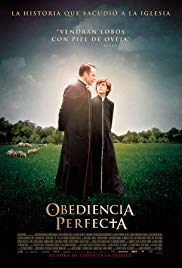
PERFECT OBEDIENCE
Spain, 2014, 98 minutes, Colour.
Juan Manuel Bernal, Sebastian Aguirre,
Directed by Luis Urquiza.
The case of the founder of the Mexican congregation, The Legionaries of Christ, Marcial Maciel, is a great scandal of the Catholic Church. Despite many rumours during his lifetime, he was not condemned by Pope John Paul II. Later, however, he was condemned by Benedict XVI and ordered to retire to a monastery. He died there two years later at the age of 88.
This dramatisation of his case opens with that sequence. It also focuses for some time on a young man – audiences realising that he was a principal victim.
The setting is in the 1960s and 70s, the time of Pope Paul VI. The place is a junior seminary where a young lad, Julian, who comes from a very staunch Catholic background, begins his seminary training with a new group and some older students. The behaviour of the students is rather more open, concerning sexuality, than that of students in English-speaking minor seminaries.
Juan Manual Bernal portrays Father Angel, the founder and superior of the Crusaders of Christ. He presents well, speaks well, exhorts priests and students piously and religiously. Julian settles in, sometimes disturbed by the behaviour of the other students, but then chosen, groomed by Angel. The film portrays with some intensity the process of grooming by a predator.
There is also something unhealthy about a number of the priests. They are very pious on the one hand. Several of them also have some sexual problems. This is particularly true of Angel – and the double standards of his life, the contradictions in his behaviour from the gospel, his manipulation of students, the favouritism towards Julian and his exploiting him and another student are portrayed strongly, implicitly rather than explicitly visual.
The film serves as a challenge to formation issues in the church, the completely inappropriate behaviour of some of the clergy, the processes of cover-up.
Another film to be seen in this connection is By the Grace of God by François Ozon about a sexual predator in France, and the trial in Lyon for inaction of the Cardinal of that city.
1. The title? Religious dimensions? Exploiting of obedience?
2. The film based on a true story? The reputation of must seal? His behaviour? Condemnation by Pope Benedict XVI?
3. A drama from Mexico, the Mexican background of the story, credible, audience disbelief and disgust?
4. The opening, the Bishop, the Pope and his condemnatory letter? Retirement to the monastery? The silent focus on Julian grown-up, his looking into the distance, memories of his experience?
5. The period, the 1960s and 70s, Paul VI as Pope, attitudes in the church, the changes, the traditions being preserved?
6. The seminary, the boys, their ages, the new recruits, the older boys, juvenile behaviour, preoccupation with sex, the priests and the supervision, the desire to save souls, putting the clergy on a pedestal, not criticising superiors? The emphasis on doing God’s will? The arrival, wearing soutanes, in the Chapel, the dormitories, the showers, the girls assisting with the cooking, the episode of the boy ogling the statue of Mary? Julian amongst these boys, the effect?
7. The regime, the priests, on the pedestal, speaking religiously, piety? The religiosity of the atmosphere? Classes? Sports and soccer? Supervision of the showers? The priest getting Julian to shout and express his anger? The effect on Julian? Susceptible at his age?
8. Father Angel, his name, his appearance, well-dressed, smile, the Superior, the touch of superciliousness, meetings, exhortations, piety and religiosity, classes, Holy Thursday ceremony and the washing of the feet, on occasion for his looking at Julian? The camera observing him? His place in high society, the women, the benefactors, the Papal medals? His interest in money?
9. The effect on Julian, his age, breaking the contact with home, having seen him initially with his family, pious Catholics, the meals, the games, the siblings, their pride in his becoming a priest? His joining the activities the boys, the sexy magazines, smoking pot? Yet the regime? The perfect candidate for grooming?
10. Angel and his behaviour, worldly manner, talking spirituality, the contrast, hypocrisy? Choosing Julian, his speech to him, his capacity for grooming, sanctifying his behaviour, Julian and his special quarters, becoming special, the public? Angel and his smoking and drinking, Julian seeing him with the sexual encounter? The bishops calling him to task, urging behaviour with women rather than with males? Double standards? The past relationship with Alberto, his pain and calling Alberto to help him, the masturbation?
11. Alberto, the effect, talking with his mother, with the priest, not believing her son? His having a special holy card? Julian searching his locker? Angel’s playing, the explanation, the relief, letting Alberto go?
12. Julian taking his place, the playing and the sexual using? The scene at the beach, the swim, the sexual encounter, Julian on the sand?
13. The reality of these events, the seeming exaggeration? The Hispanic atmosphere, towards sexuality, more overt than English-speaking countries, issues of scandal and standards? The end and the audience remembering Angel and his condemnation?